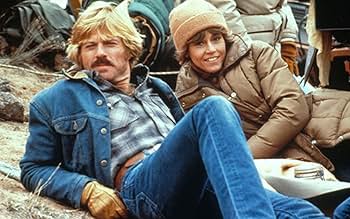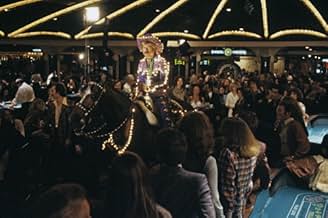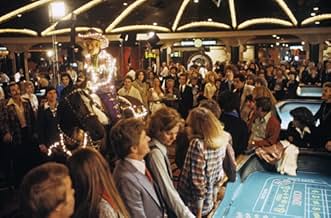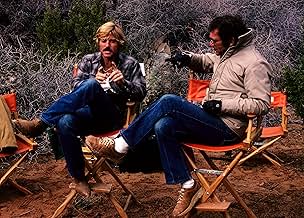ÉVALUATION IMDb
6,4/10
10 k
MA NOTE
Un champion de rodéo sur le retour vole le cheval de son entreprise et s'enfuit dans le désert, avec une fougueuse journaliste à ses côtés.Un champion de rodéo sur le retour vole le cheval de son entreprise et s'enfuit dans le désert, avec une fougueuse journaliste à ses côtés.Un champion de rodéo sur le retour vole le cheval de son entreprise et s'enfuit dans le désert, avec une fougueuse journaliste à ses côtés.
- Nommé pour 1 oscar
- 1 victoire et 1 nomination au total
James Sikking
- Dietrich
- (as James B. Sikking)
Quinn K. Redeker
- Bud Broderick
- (as Quinn Redeker)
Lois Hamilton
- Joanna Camden
- (as Lois Areno)
Histoire
Le saviez-vous
- AnecdotesThe name of Sonny Steele's horse in the film is "Rising Star". The star steed was played by a 5-year-old bay thoroughbred called "Let's Merge" after a 6-month equine talent search. Robert Redford bought the horse after production was complete and owned him for 18 years before the horse passed away.
- GaffesThe video footage shown on television of Sonny Steele's speech about the horse doesn't match what Alice would have actually shot. The camera movement, lighting and direction of where Steele was facing while talking is completely different.
- Autres versionsThe film's original soundtrack has been changed in different ways for its two DVD releases:
- The Image DVD replaces Dave Grusin's beautiful "Freedom Epilogue" score music (where the horse is set free) with a reprise of "My Heroes Have Always Been Cowboys" by Willie Nelson, originally heard during the opening credits. This actually works well, though one wonders why a piece of original score had to be changed.
- The newer Universal release goes a step further, removing "My Heroes Have Always Been Cowboys" from the opening credits (and in fact from the film completely) as well as "Freedom Epilogue" and replaces them both with a very inappropriate generic harmonica-driven instrumental which is meant to sound like a Willie Nelson song.
Commentaire en vedette
OK, first, to the reviewer that suggested "too much Fonda" and would have liked to see Susan St. James or Jennifer Warren in the role of Alice, you are forbidden from ever reviewing again. Fonda was perfect, and more on that later.
Second, this is not about a cowboy freeing a horse who is about to be drugged, as some reviewers have said. The horse was drugged from the beginning. Sonny noticed it, and that was a contributing factor to his subsequent actions.
This movie is about a man who strayed far from who he was, and who sought to find himself again. The horse is metaphoric: it is drugged, exploited, and broken, just like the man. So, the man attempts to find himself, as he helps the horse find itself again, so to speak. And, in the process of trying to report the story, the Fonda character attempts to find herself as well, for she has become neurotic, pill-popping, and uptight in her quest to become a star reporter. And, of course, as they travel the countryside, we find America.
Back to Fonda. Fonda's casting has always been that of the strong but flawed "career" woman, from "Barbarella", to "Klute", to "Electric Horseman". She is independent, doesn't need a man. As the tough and aggressive reporter in personal crisis, she is cast perfectly. St. James has neither the strength nor the necessary equal dose of vulnerability that Fonda can muster. This is about chemistry as well. Redford and Fonda have teamed up before, and the chemistry is proved.
So this brilliant and simple story illustrates and creatively reinforces the the idea of straying from true nature, and the need to find it again.
VERY good film.
Second, this is not about a cowboy freeing a horse who is about to be drugged, as some reviewers have said. The horse was drugged from the beginning. Sonny noticed it, and that was a contributing factor to his subsequent actions.
This movie is about a man who strayed far from who he was, and who sought to find himself again. The horse is metaphoric: it is drugged, exploited, and broken, just like the man. So, the man attempts to find himself, as he helps the horse find itself again, so to speak. And, in the process of trying to report the story, the Fonda character attempts to find herself as well, for she has become neurotic, pill-popping, and uptight in her quest to become a star reporter. And, of course, as they travel the countryside, we find America.
Back to Fonda. Fonda's casting has always been that of the strong but flawed "career" woman, from "Barbarella", to "Klute", to "Electric Horseman". She is independent, doesn't need a man. As the tough and aggressive reporter in personal crisis, she is cast perfectly. St. James has neither the strength nor the necessary equal dose of vulnerability that Fonda can muster. This is about chemistry as well. Redford and Fonda have teamed up before, and the chemistry is proved.
So this brilliant and simple story illustrates and creatively reinforces the the idea of straying from true nature, and the need to find it again.
VERY good film.
- ejb4501
- 14 déc. 2004
- Lien permanent
Meilleurs choix
Connectez-vous pour évaluer et surveiller les recommandations personnalisées
- How long is The Electric Horseman?Propulsé par Alexa
Détails
Box-office
- Budget
- 12 500 000 $ US (estimation)
- Brut – États-Unis et Canada
- 61 801 971 $ US
- Brut – à l'échelle mondiale
- 61 801 971 $ US
Contribuer à cette page
Suggérer une modification ou ajouter du contenu manquant

Lacune principale
By what name was Le cavalier électrique (1979) officially released in India in English?
Répondre

































